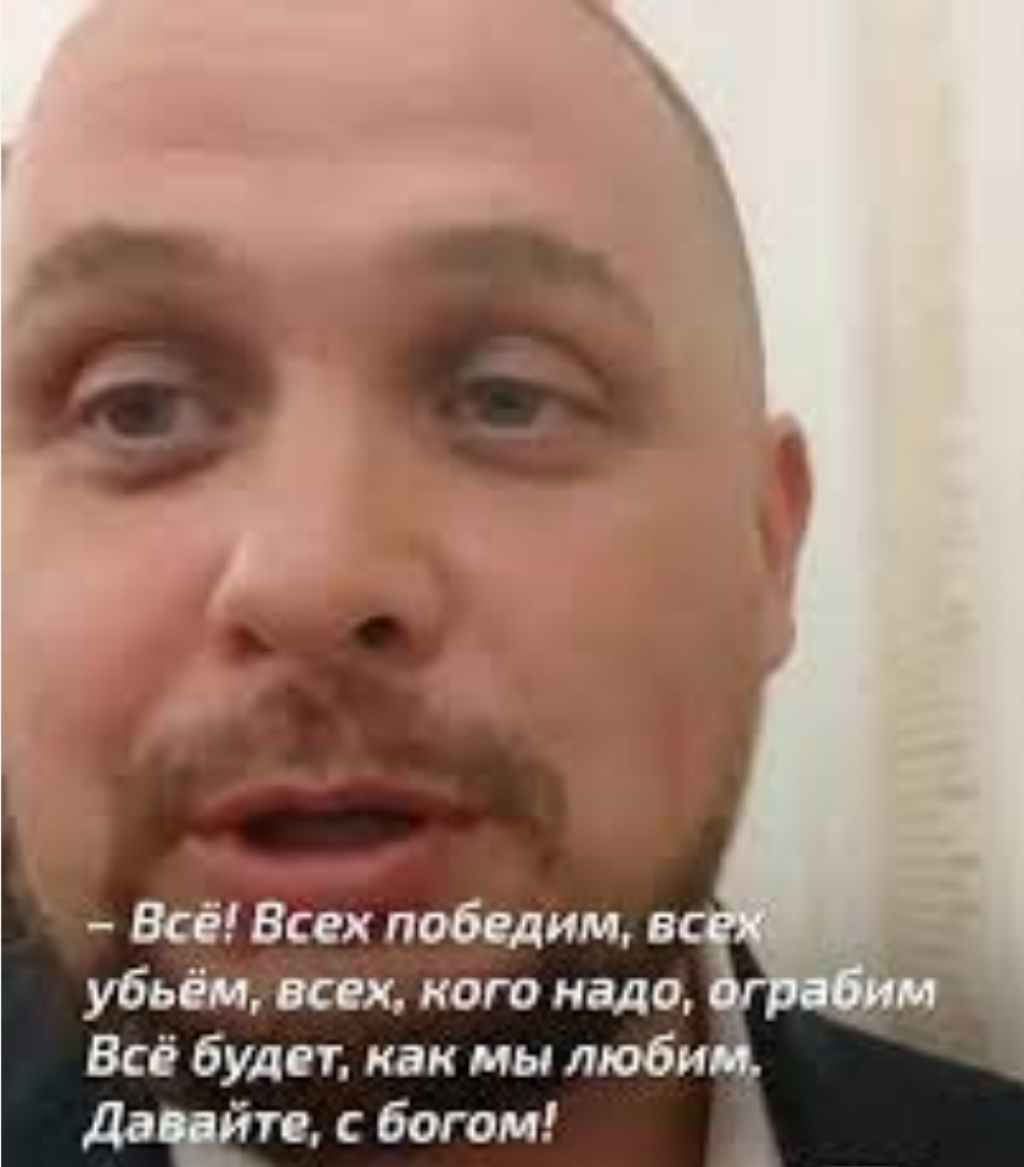The Jordan Center stands with all the people of Ukraine, Russia, and the rest of the world who oppose the Russian invasion of Ukraine. See our statement here.
Michael Gorham is a Professor of Russian Studies at the University of Florida, writing on topics relating to political rhetoric and the Russian-language internet.
Above: A screenshot of Vladlen Tatarsky bragging about "conquering, killing, robbing everyone" in Ukraine at the Kremlin on 30 September 2022. Source: Doxa
The Ukraine war left an unwelcome calling card at a St. Petersburg cafe on Sunday, 2 April, when a statuette delivered to well-known war correspondent [voenkor] and blogger, Vladlen Tatarsky (aka Maksim Fomin), exploded upon delivery, immediately killing the pro-Kremlin Ukrainian national from the Donetsk Oblast.
Almost immediately, media from all corners began speculating as to the assassination’s cause. Although 26-year-old Daria Trepova, the young woman who presented Tatarsky with the statuette, was arrested on the spot and later charged with an act of terrorism, presidential spokesperson Dmitrii Peskov quickly attributed the murder to the "Kiev regime." The Russian National Antiterrorist Committee later went one step further to implicate Aleksey Navalny's Anti-Corruption Foundation (FBK), even though Navalny himself has been languishing in prison for 27 months, and the vast majority of his production and reporting team has fled to safer Western capitals. (Both the Ukrainian government and the FBK leadership deny any involvement in the murder.) Still others see it as some sort of inside job, perhaps by actors from security agencies, many of whom are unhappy with Evgenii Prigozhin—businessman, jack-of-all-dark-political-arts, head of the private military company known as the “Wagner Group,” and former owner of the cafe where the attack took place. Ukrainian presidential advisor Mikhail Podoliak put this view most expressively in a tweet immediately following the explosion: "In Russia it has begun: the spiders are eating one another inside the jar."
Networking Putinism
Less discussed in the aftermath of the attack is the multipurpose social networking platform Telegram, which provided this ex-criminal from Donbas with a platform for expressing his Russian nationalist views and garnering over a half-million followers. Telegram is known for its premium on privacy and security. Created and launched by Russian web developer and entrepreneur, Pavel Durov, and his brother Nikolai in 2013, the platform saw its user share shoot up among Russians after the outbreak of the war on Ukraine, when access to Western-operated applications became restricted, displacing Instagram in the list of the top five most widely used platforms.
The importance of social networks for providing oppositional politicians a public platform in Russia has been clear since Alexey Navalny emerged on LiveJournal over two decades ago. But social media is also increasingly important for promoting pro-state interests as more and more Russians rely on the internet for news and information. The government’s attempts to block Telegram in the spring of 2018 failed not only because security agencies did not possess the requisite technologies, but also due to tepid support for the measure among the ruling elite itself—many of whom had come to depend on the platform for publicity and communication themselves.
The late Tatarsky’s trajectory encapsulates the awkward evolution of the pro-Kremlin internet. On the one hand, as a bona fide pro-Russian patriot embedded in the conflict zone, he struck a stark contrast to the Petersburg trolls Prigozhin first employed in the early 2010s to flood domestic and foreign social networks with fake posts and misinformation. These earlier trolls were more interested in making a quick buck than demonstrating ideological purity, but Tatarsky and his ilk were different. As odious as the voenkor’s posts sound to those beyond the realm of "turbo-patriots," their rawness and sincerity proved capable of raising spirits and stoking anger among loyal followers during a military campaign that has provided Putin loyalists with too few opportunities to celebrate. Tatarsky is best known for his video post from inside the Kremlin at the 30 September 2022 ceremony annexing occupied territories of the Donbas into Russia, in which he promised viewers that "We will beat everyone, kill everyone, rob whoever we need to, just as we love to do."
Russian alt-right unleashed
Tatarsky’s own criminal background (he was convicted of bank robbery in 2011), along with his penchant for calling out Russian military leaders for their failure to provide frontline soldiers with the necessary equipment, information, and strategic acumen, firmly aligned him with the nationalistic strain of "turbo-patriots." Though they strongly support Putin, members of this group consider themselves such true believers that they can afford, and even flaunt, the privilege of speaking truth in the name of the greater pro-Russian cause. This principle holds even when these “truths” excoriate Russian military leadership or are expressed in vulgar terms seemingly inappropriate for the Kremlin.
In Tatarsky’s case, his close ties to Prigozhin won him no friends at the Ministry of Defense. Prigozhin himself regularly criticizes Defense Minister Sergei Shoigu for the army’s poor performance on the battlefield and the Ministry’s failure to provide his fighters with sufficient support. As a result, some conspiracy theorists have even suggested that Tatarsky’s assassination was an "inside job” aimed at Prigozhin. Yet despite being the occasional thorn in the side of authorities accustomed to total control of the wartime narrative, Tatarsky stood as a (once-)living example of the fact that effective persuasion requires more than the endless repetition of centrally generated talking points. It requires, instead, a mix of authenticity, charisma, and relatability that more often than not defies regulatory control. (See Navalny, Alexey.)
It is this awkward tension between a true believer’s conviction and authoritarian control that has given rise to the swirl of conjectures surrounding the assassination. Beyond the hazy "who done it?" question, however, Tatarsky's assassination signals that the internet and social networks are now far more than either a haven for anti-Putin oppositional voices or a dark space for Kremlin trolls. They are a critical and contested arena for advancing ideas within a range of narratives, more often in shades of gray than black or white. At the same time, the authorities' early implication of Navalny's FBK team in the "terrorist act" serves as a stark reminder of their sustained fear of the opposition politician, despite his two-plus years in maximum security prison.
Even if the supposedly impending blocking of YouTube in Russia comes to pass, alternative digital platforms like Telegram will continue to offer opportunities for thinkers, activists, and influencers across the political spectrum to express themselves. Even in its “sovereign” guise, the internet remains a persistently awkward necessity for a Kremlin that dreams of total containment.



